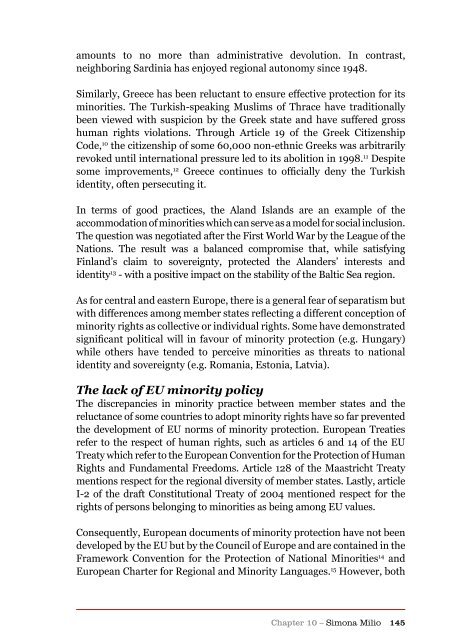Authors Iain Begg | Gabriel Glöckler | Anke Hassel ... - The Europaeum
Authors Iain Begg | Gabriel Glöckler | Anke Hassel ... - The Europaeum
Authors Iain Begg | Gabriel Glöckler | Anke Hassel ... - The Europaeum
Create successful ePaper yourself
Turn your PDF publications into a flip-book with our unique Google optimized e-Paper software.
amounts to no more than administrative devolution. In contrast,<br />
neighboring Sardinia has enjoyed regional autonomy since 1948.<br />
Similarly, Greece has been reluctant to ensure effective protection for its<br />
minorities. <strong>The</strong> Turkish-speaking Muslims of Thrace have traditionally<br />
been viewed with suspicion by the Greek state and have suffered gross<br />
human rights violations. Through Article 19 of the Greek Citizenship<br />
Code, 10 the citizenship of some 60,000 non-ethnic Greeks was arbitrarily<br />
revoked until international pressure led to its abolition in 1998. 11 Despite<br />
some improvements, 12 Greece continues to officially deny the Turkish<br />
identity, often persecuting it.<br />
In terms of good practices, the Aland Islands are an example of the<br />
accommodation of minorities which can serve as a model for social inclusion.<br />
<strong>The</strong> question was negotiated after the First World War by the League of the<br />
Nations. <strong>The</strong> result was a balanced compromise that, while satisfying<br />
Finland’s claim to sovereignty, protected the Alanders’ interests and<br />
identity 13 - with a positive impact on the stability of the Baltic Sea region.<br />
As for central and eastern Europe, there is a general fear of separatism but<br />
with differences among member states reflecting a different conception of<br />
minority rights as collective or individual rights. Some have demonstrated<br />
significant political will in favour of minority protection (e.g. Hungary)<br />
while others have tended to perceive minorities as threats to national<br />
identity and sovereignty (e.g. Romania, Estonia, Latvia).<br />
<strong>The</strong> lack of EU minority policy<br />
<strong>The</strong> discrepancies in minority practice between member states and the<br />
reluctance of some countries to adopt minority rights have so far prevented<br />
the development of EU norms of minority protection. European Treaties<br />
refer to the respect of human rights, such as articles 6 and 14 of the EU<br />
Treaty which refer to the European Convention for the Protection of Human<br />
Rights and Fundamental Freedoms. Article 128 of the Maastricht Treaty<br />
mentions respect for the regional diversity of member states. Lastly, article<br />
I-2 of the draft Constitutional Treaty of 2004 mentioned respect for the<br />
rights of persons belonging to minorities as being among EU values.<br />
Consequently, European documents of minority protection have not been<br />
developed by the EU but by the Council of Europe and are contained in the<br />
Framework Convention for the Protection of National Minorities 14 and<br />
European Charter for Regional and Minority Languages. 15 However, both<br />
Chapter 10 – Simona Milio 145

















